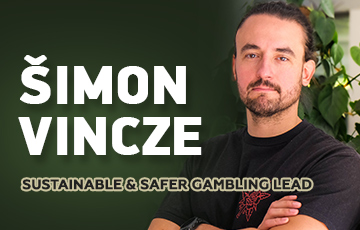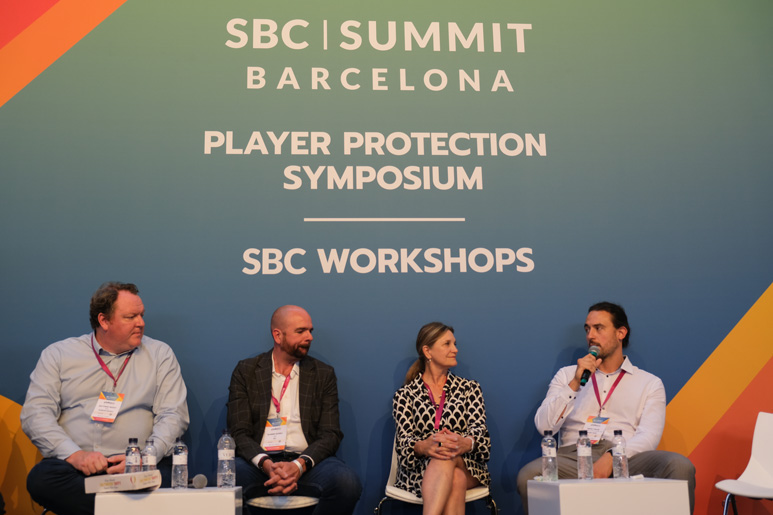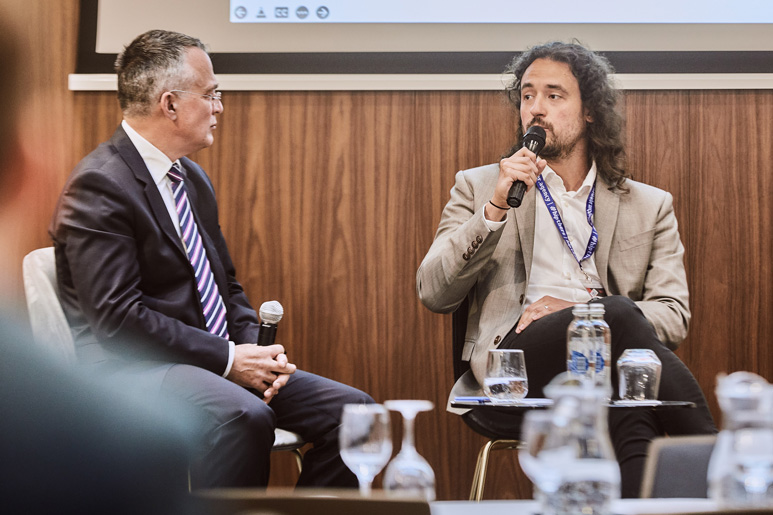«Safer gambling is not about taking the risk out of gambling» — Interview with Simon Vincze, Sustainable & Safer Gambling Lead

We continue our series of interviews with prominent figures in the world of gambling, and our guest today is Simon Vincze, a specialist in creating safe gambling environments. He kindly agreed to answer our questions and shared plenty of interesting aspects about one of the most important issues in the industry. The questions we consider are what is safe gambling, how can we protect players from gambling addiction, and how do we make self-limiting tools in online casinos more effective? We also talk about the prospects for creating a Global Self-Exclusion System and how individual companies impede the implementation of this idea. Learn about this and much more with today’s guest.
— Please introduce yourself to our readers and tell us a little about yourself.
— My name is Simon; I am a husband and a father of two living in Slovakia’s capital, Bratislava. I like to spend my days active, usually by riding a bike or swimming in the morning. I enjoy meeting with people, and insightful discussions make me equally as happy. I also like fun and spending considerable time with my friends and family. I adore sci-fi, a thoughtful book, and a classic action movie.
— You are working on creating safe gambling. Please let us know what you mean by it. Aren’t gambling and safety polar opposites by definition? After all, the whole point of gambling is excitement and risk, and if you take it away, how is it different from the usual computer / casual gaming?
— Safer gambling is not about taking the risk out of gambling, but rather about reducing the consequences of taking these risks through education, limitation of play, and accessibility of help in case things go out of hand. Safer gambling is meant to reduce gambling-related harm, among others, by utilizing concepts such as monitoring players’ gambling activity for potential markers of harm and subsequent intervention. I do not see it as an activity going against gambling at all; actually quite the opposite. By sticking to safer gambling principles, online gambling can become a more sustainable activity for everyone.
— Tell us about gambling addiction. How do you notice the first signs of gambling addiction? Can you somehow protect yourself from it?
— Addiction is a highly complex phenomenon that applies to a much broader spectrum than just gambling. In my opinion, addiction itself appears as a reaction to some sort of pain, and the affected person uses the addictive activity as an escape. Gambling addiction is one of the most vicious addictions out there, as enormous harm can happen unnoticeably. I think it is essential to be conscious of one’s gambling activity. Start by answering the fundamental question of why you are doing this and then stick to the baseline rules, such as not seeing gambling as a way to make money or chasing losses.
— The most effective measure to combat gambling addiction is self-exclusion. Casino Guru is working on the ambitious Global Self-Exclusion Initiative project to help players timely self-exclude from gambling. What are the shortcomings of the current self-exclusion tools?
— I am unsure if self-exclusion is the best way to combat addiction, but it is undoubtedly the best tool to stop gambling harm. Some might say that it makes more sense to focus on preventing addiction; thus, no self-exclusion will be needed.

Even though it makes sense, we are not there yet, and compulsive gamblers are unable to control themselves. That’s where the power of self-exclusion lies, but unfortunately, even the current most effective structures are still limited to online operators from one country. Finding a casino beyond that scope is a matter of just a few clicks.
— At casinos, you can set a limit on the deposit for any period and limit the game time. Yet at the same time, you can remove these restrictions if you change your mind. Should casinos allow it or should they keep the self-limits despite your wish to remove them?
— I am convinced that in order to be effective, limiting tools must result from the player’s informed decision. The best scenario is when players are convinced these tools are necessary for a positive gambling experience, and education with design of such tools plays a crucial part in that. Changes to previously set limits should not be allowed immediately after the request, and some waiting time before their implementation should be enforced to avoid compulsive decisions.
— Do you think one self-exclusion is enough to overcome gambling addiction? Or do you think additional measures are necessary?
— Some players with problem gambling experience see self-exclusion as the only necessary tool to avoid problem gambling for life, and it is working for them. However, I am a bit skeptical about this. I would instead rely on taking mindful steps with professional help, especially because addicts are most realistic about their gambling habits at the time of self-exclusion. This window might serve very well for a more substantial change in a person’s life.
— You are planning to create a global system where all casinos could be united so that a player could immediately remove their access to all casinos. How realistic is it to combine all sites into one network? How long will it take? Why do you think casinos need it?
— I think we will never be able to get everyone under one umbrella. Unfortunately, there will always remain some gray or black area, but perhaps we will be able to identify it better when most operators are part of the scheme. We have a long journey ahead of us, but I am optimistic about going in the right direction.

The importance of player protection has increased significantly over the past few years, and even though regulations in many countries are lacking behind, the best practices are being shared globally. At least to some extent. Operators worldwide look up to industry leaders, and if they are convinced that global self-exclusion is needed for them to fulfill the demand for player protection, others will join. My job is to build such a structure.
— Why did casinos start supporting the principles of responsible gaming? Isn’t it beneficial for them if players can’t control themselves and spend all their money on bets?
— Firstly, there are regulations in the leading markets that are pushing the player protection agenda forward. Secondly, operators around the world have started to realize that a healthy customer base is more profitable in the long run. No one wants problem gamblers, as these can bring high profits only for a limited period of time, and the tragic consequences of addiction send a strong backlash against the industry. On the other hand, having a baseline of customers playing within their limits could represent a lifetime of revenue without a hassle.
— Some casinos are set to look for addicted players and invite them to play. Do you want these sites to join your initiative? How do you plan to convince them to work with you and switch from the dark side to the light side?
— As I mentioned before, we won’t be able to convince everybody. There will always be individuals and companies set up to exploit the sensitive part of human nature, and these will not pay much attention to principles of social responsibility or sustainable business. However, there is hope after all. For example, underage gambling is a no-go zone for most, and even deceitful companies will think twice before letting people under 18 to gamble. Perhaps something similar can happen to the self-exclusion, but there is a long way to go.
— When you combine all the casinos into one network, and players get the option to self-exclude in just one click, what can you do as a player if you change your mind? Isn’t there a risk of them turning to unlicensed casinos?
— Yes, there will always be such a risk. In my experience, gambling addicts are one of the most cunning ones when looking for ways to gamble. The nature of online gambling does not allow us to build a 100% bulletproof solution, as there will always be an alternative. However, we can put in enough obstacles and friction to dissuade these people from enduring the journey to gamble further. For example, if they’ll know that all casinos that will allow them to play are fraudulent and most probably will not pay out their potential winnings, they might think twice about putting their money on the line again.
— You have also created the Online Casino Complaint Resolution Center where players could complain about any casino. Some players mentioned their addiction, saying that self-exclusion did not help. Have players ever shared their personal addiction stories? Can you tell us the most memorable one?
— The Complaints Resolution Center is the work of my outstanding colleagues from the data department. Besides helping players with their complaints, they deal with information about online casinos and set up their reputation ratings.

Most complaints about self-exclusion are connected to infringement from the side of the casino. Nonetheless, I am receiving many requests from people struggling with self-exclusion on the Global Self-exclusion website’s contact form. I must tell them that the global system is not live yet and try to support them. Sometimes they tend to share with me a little bit more about their experience, like Charlie, with whom we did an extensive interview.
— Have you yourself ever felt addicted to gambling?
— No. I liked playing video games when I was younger and sometimes spent too much time with it, but I cannot say I have ever felt addicted.
— Do you bet with money? Are you ever afraid of becoming addicted? Or do you have your own tricks to avoid addiction? If so, would you care to share them?
— I do bet on e-sports from time to time. I tried slots a few times, but it does not give me any thrill. Watching e-sports with live bets is fun, as I played these games in the past. Sometimes I think I can outsmart the odds, but it does not always work. To be honest, I do sometimes feel like I want to chase the recent loss, but then I realize I need to let it go.
— You have two children. How do you think you will react if one day they confess to having a gambling addiction?
— I would support them for sure, but more importantly, I would want them to tell me or someone else who can help them. I feel like the stigma lying over gambling makes it very hard for some to take the first step toward recovery. Gambling is fun and people like to do it, but anybody can become addicted. Seeing gambling as a socially acceptable way of entertainment with certain risks opens the door for dealing with struggles appropriately. Shame and self-denial prevent many from working on a change.
— Please give some advice to players who are struggling with gambling addiction.
— Do not lose hope and do your best to kick the addiction in the butt! No one is going to do it for you. Everybody can screw up, but what matters is that you do something about it. Try to find more information, talk to someone, learn about people who prevailed, inspire yourself, do not be ashamed to ask for help, and go all the way.
— Šimon, thank you very much for your time and your great answers!


